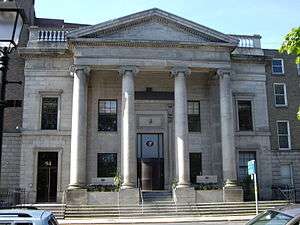Department of Justice and Equality
| Department overview | |
|---|---|
| Formed | 22 January 1919 |
| Jurisdiction | Ireland |
| Headquarters |
94 St Stephen's Green, Dublin 2 53°20′14″N 6°15′41″W / 53.33722°N 6.26139°W |
| Minister responsible | |
| Department executive |
|
| Website |
www |
The Department of Justice and Equality (Irish: An Roinn Dlí agus Cirt agus Comhionannais) is a department of the Government of Ireland. It is led by the Minister for Justice and Equality who is assisted by one Minister of State. The Department's mission is to maintain and enhance community security and to promote a fairer society in Ireland.
Departmental team
- Minister for Justice and Equality: Frances Fitzgerald, TD
- Minister of State for New Communities, Culture and Equality: Aodhán Ó Ríordáin, TD
- Secretary General of the Department: Noel Waters (acting)
Overview

The mission of the Department of Justice and Equality is to maintain and enhance community security and equality through the development of a range of policies and high quality services which underpin:
- The protection and assertion of human rights and fundamental freedoms consistent with the common good
- The security of the State
- An effective and balanced approach to tackling crime
The official headquarters and Ministerial offices of the Department are in 94 St Stephen's Green, Dublin 2. Over the years its name has changed several times, with some changes in its role. The Department has been known as the following:
- Department of Home Affairs (1919–1923)
- Department of Justice (1923–1997)
- Department of Justice, Equality and Law Reform (1997–2010)
- Department of Justice and Law Reform (2010–2011)
- Department of Justice and Equality (2011–present)
In July 2014 the department embarked on a comprehensive program of change, including the recruitment of a new secretary-general following an independent review.[1]
Responsibilities
The Department's main areas of responsibility include:
- Implementing government policy on crime and protecting the security of the State (National Security Committee).
- Providing policy advice in relation to the criminal justice system (Garda Síochána, the Courts, Prisons and Probation and Welfare Services) and supporting the operation of this system.
- Continuing reform of the criminal law and certain areas of the civil law.
- Playing a central part in the implementation of core elements in the Belfast Agreement.
- Co-operating in relevant EU and international matters and promoting Ireland's interests within the associated areas of responsibility.
- Implementing the Government's asylum strategy and further developing national immigration policy.
Executive Agencies
The Department has five Executive Agencies, which legally are integral parts of the Department but which are managed separately:
- Irish Naturalisation and Immigration Service
- Reception and Integration Agency
- Forensic Science Laboratory
- Probation and Welfare Service
- Irish Prison Service
Affiliated bodies
Among the state agencies and other bodies affiliated to the Department in some way are:
- Garda Síochána
- Courts Service of Ireland
- Equality Authority
- Equality Tribunal
- Garda Síochána Ombudsman Commission
- Garda Síochána Inspectorate
- Legal Aid Board
- State Pathologist's Office
- National Disability Authority (NDA)
- Office of the Data Protection Commissioner
- Irish Film Classification Office
- Office of the Refugee Applications Commissioner
- Refugee Appeals Tribunal
- Private Security Authority
- Property Registration Authority
No state-sponsored bodies of the Republic of Ireland report to the Department.
References
- ↑ "Change coming for Justice and Equality department". Irish Sun.com. Retrieved 28 July 2014.